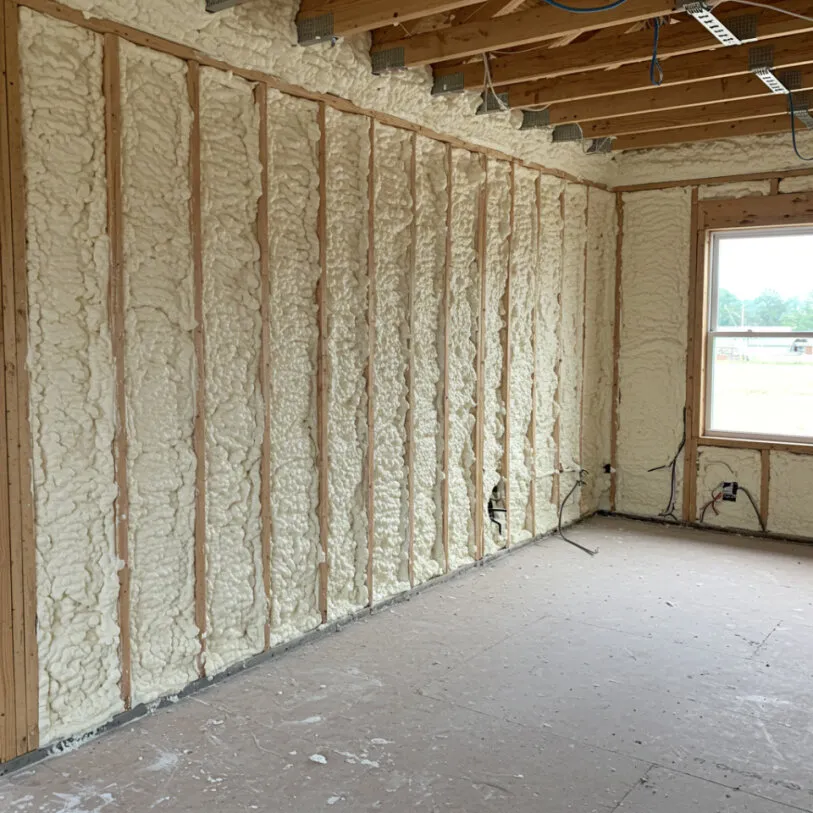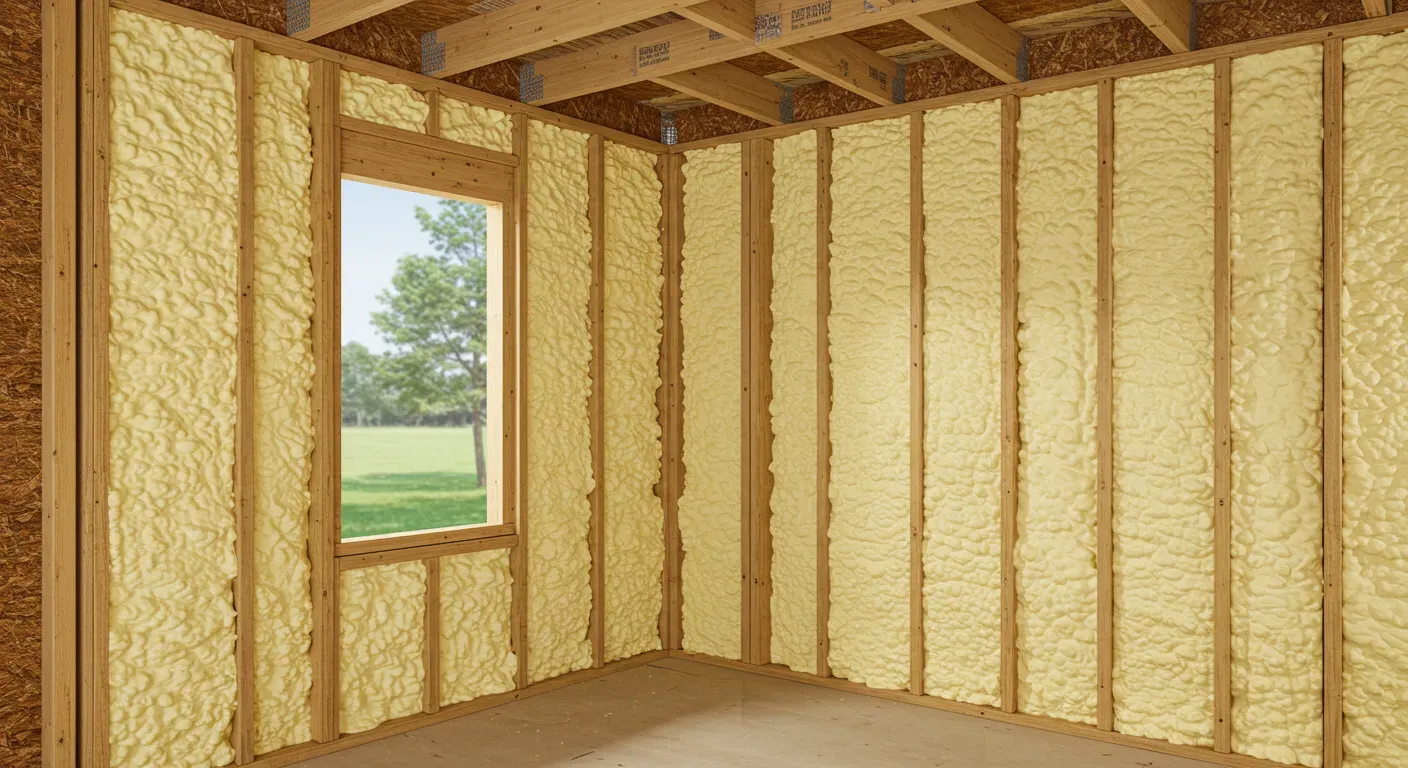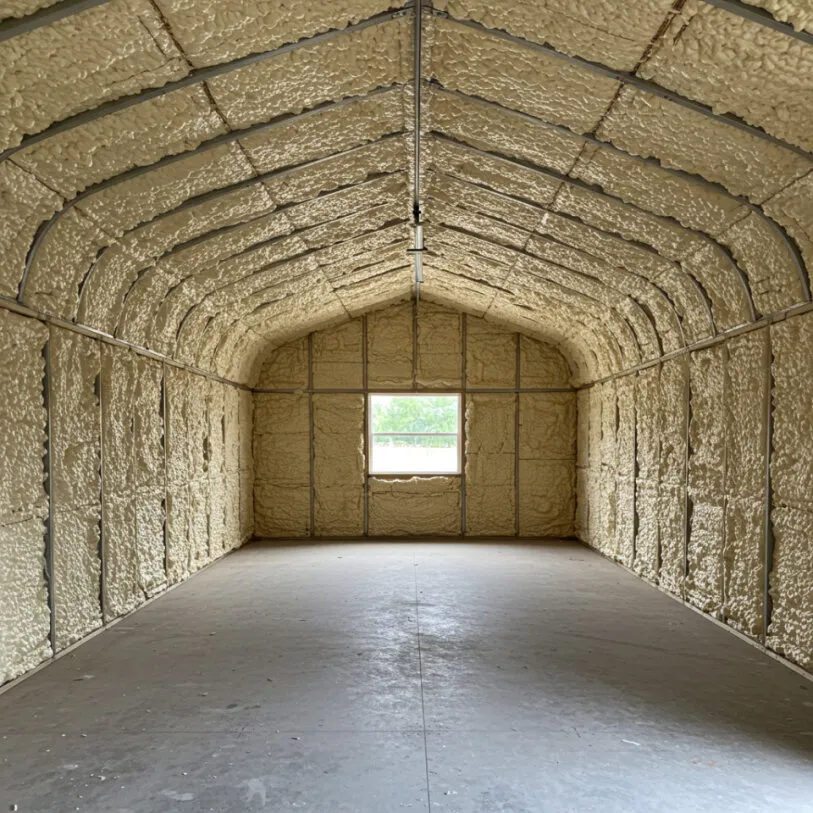
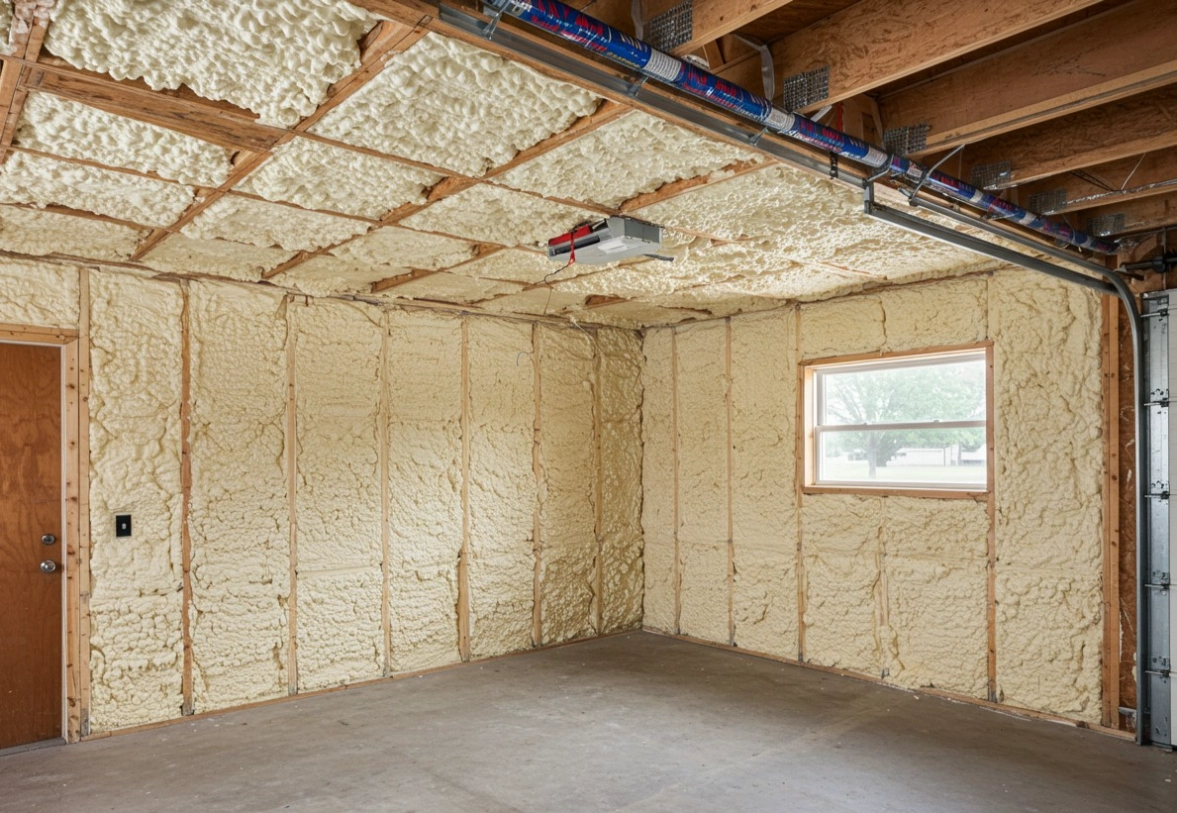
The best insulation for Burien homes depends on specific structural needs, climate conditions, and energy efficiency goals. Closed-cell spray foam delivers superior performance for moisture control and air sealing in this Pacific Northwest climate, while open-cell spray foam provides excellent soundproofing and thermal regulation at a lower density. Traditional fiberglass and cellulose options offer budget-friendly alternatives but lack the comprehensive air sealing capabilities essential for Burien’s humid climate conditions.
Each insulation type serves distinct purposes based on application area, moisture exposure, and performance requirements. This comprehensive analysis examines the technical specifications, climate considerations, and practical applications to help homeowners make informed decisions about insulation upgrades.
Burien’s marine climate presents unique challenges for home insulation systems. The region experiences moderate temperatures year-round with high humidity levels averaging 70-80% during winter months. These conditions require insulation materials that resist moisture infiltration while maintaining thermal efficiency.
The Pacific Northwest’s temperature fluctuations between 35°F in winter and 75°F in summer create thermal bridging concerns in traditional construction methods. Effective insulation must address both temperature control and moisture management to prevent mold growth and structural damage.
Bonus Tip: Monitor indoor humidity levels between 30-50% to optimize insulation performance and prevent condensation issues common in Burien’s climate.
| Insulation Type | R-Value per Inch | Moisture Resistance | Air Sealing | Longevity | Best Application |
|---|---|---|---|---|---|
| Closed-Cell Spray Foam | R-6.0 to R-7.0 | Excellent | Superior | 25+ years | Basements, crawl spaces, exterior walls |
| Open-Cell Spray Foam | R-3.5 to R-4.0 | Good | Excellent | 20+ years | Interior walls, attics, sound barriers |
| Fiberglass Batts | R-3.1 to R-3.4 | Poor | None | 15-20 years | Interior walls, accessible attics |
| Blown-In Cellulose | R-3.2 to R-3.8 | Fair | Minimal | 20-25 years | Attic floors, wall cavities |
According to the Department of Energy, properly installed spray foam insulation can reduce energy consumption by 40-60% compared to traditional materials in marine climates. This performance advantage becomes particularly significant in Burien’s humid conditions where air sealing prevents moisture-related efficiency losses.
| Property | Closed-Cell Requirements | Open-Cell Requirements | Traditional Material Limits |
|---|---|---|---|
| Density (lbs/ft³) | 1.7 to 2.0 | 0.4 to 0.7 | 0.6 to 2.3 |
| Vapor Permeability | <1.0 perm | 7-15 perms | Varies widely |
| Compressive Strength | 25-40 psi | 3-5 psi | 0.1-2 psi |
| Thermal Drift | Minimal | None | Not applicable |
| Installation Temperature | 60-80°F | 60-80°F | Any temperature |
The Washington State Building Code requires minimum R-values of R-30 for attics and R-21 for walls in climate zone 4C, which includes Burien. Spray foam applications often exceed these requirements while providing additional benefits through comprehensive air sealing.
Open-cell spray foam excels in attic applications where sound dampening and thermal regulation take priority over vapor barriers. The material’s expansion properties fill irregular spaces effectively while allowing necessary moisture vapor transmission.
Closed-cell spray foam provides essential moisture protection in below-grade applications. Its vapor barrier properties prevent ground moisture infiltration while delivering superior insulation values in compact spaces.
Bonus Tip: Install proper ventilation systems before applying closed-cell foam in basements to prevent trapped moisture issues.
Wall insulation selection depends on construction type and moisture exposure. Closed-cell foam works best for exterior applications, while open-cell foam suits interior cavity installations where vapor transmission remains necessary.
Structural compatibility requires professional assessment before insulation installation. Older homes may need electrical or plumbing updates to accommodate spray foam applications safely. Building permits may be required for comprehensive insulation upgrades depending on project scope.
Budget considerations extend beyond initial material costs to include long-term energy savings and maintenance requirements. While spray foam applications cost more upfront, energy savings often recover initial investments within 3-5 years in Burien’s climate.
Professional installation ensures proper application and warranty coverage. DIY installations void manufacturer warranties and may create performance issues or safety hazards. Qualified contractors understand local building codes and climate-specific requirements.
Bonus Tip: Schedule insulation installation during dry seasons (late spring through early fall) for optimal curing conditions and contractor availability.
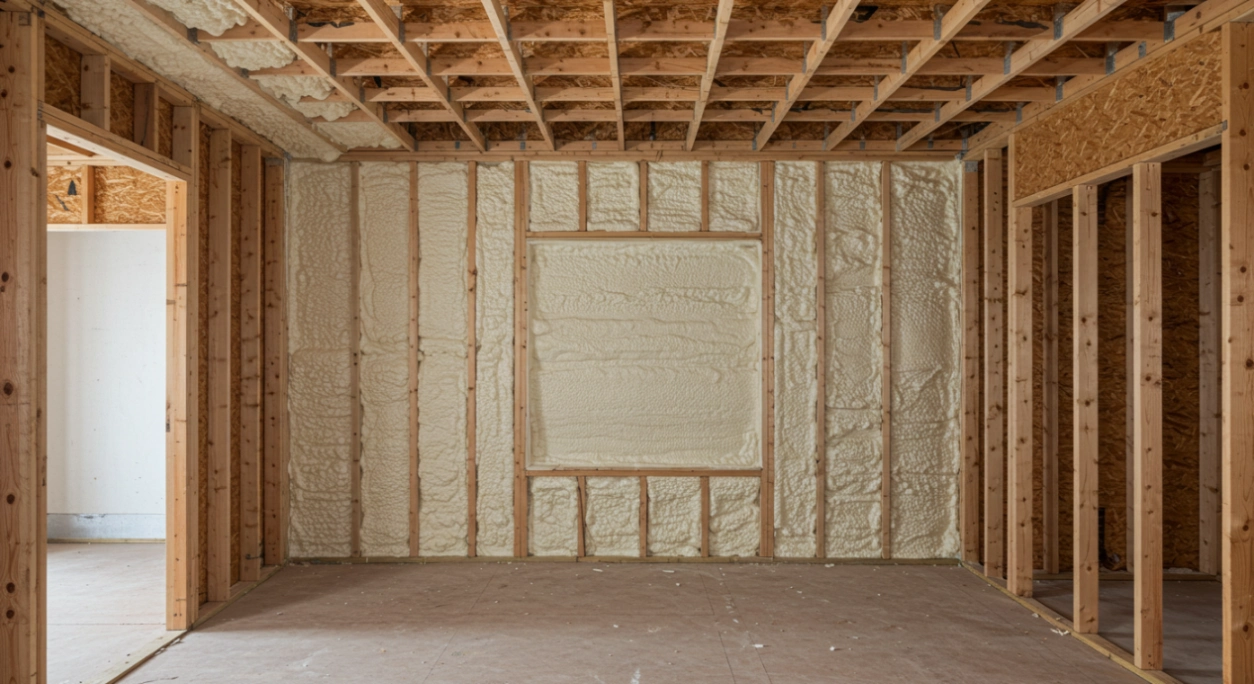
Complete home insulation systems using both open-cell and closed-cell applications. Custom solutions address specific climate challenges while maximizing energy efficiency for Burien homeowners.
Specialized attic insulation focusing on thermal performance and moisture management. Professional assessment determines optimal material selection based on existing conditions and performance goals.
Comprehensive basement and crawl space insulation preventing moisture infiltration and thermal loss. Expert installation ensures proper vapor barrier placement and ventilation integration.
Interior and exterior wall insulation services addressing thermal bridging and air sealing requirements. Professional installation guarantees building code compliance and optimal performance.
Closed-cell spray foam typically offers the highest long-term value through superior energy savings and durability, despite higher initial costs.
High humidity reduces thermal efficiency in traditional materials while spray foam maintains consistent performance through air sealing properties.
Climate zone, building construction, and target R-values determine thickness needs, with spray foam achieving higher values in thinner applications.
Professional installations often combine materials strategically, using closed-cell foam for moisture areas and open-cell foam for interior applications.
Selecting appropriate insulation requires balancing performance requirements, budget constraints, and long-term goals. Burien’s marine climate demands materials that address both thermal efficiency and moisture management effectively.
Professional assessment provides accurate recommendations based on home-specific conditions, existing insulation performance, and energy efficiency objectives. Expert evaluation identifies problem areas and optimal upgrade strategies for maximum benefit.
Consider insulation upgrades as long-term investments in home comfort, energy efficiency, and property value. Quality materials and professional installation deliver decades of reliable performance while reducing ongoing energy costs.
Making the right insulation choice requires understanding your home’s specific needs and Burien’s unique climate challenges. Professional assessment ensures optimal material selection and installation quality for maximum performance and longevity.
Cascadia Spray Foam of Seattle provides comprehensive insulation solutions tailored to Pacific Northwest conditions. Expert evaluation and professional installation guarantee building code compliance and energy efficiency goals. Contact our team at (425) 386-3500 or email [email protected] for detailed consultation and project planning assistance.
Properly installed spray foam insulation maintains its R-value and air sealing properties for 25-30 years with minimal degradation, significantly longer than traditional materials.
Spray foam insulation requires virtually no maintenance once properly installed, while traditional materials may need periodic inspection and replacement due to settling or moisture damage.
Most homeowners see immediate energy bill reductions with comprehensive insulation upgrades, with full payback periods typically ranging from 3-7 years depending on system type and home characteristics.
Modern spray foam formulations cure completely within 24-48 hours and improve indoor air quality by eliminating drafts and reducing allergen infiltration through air sealing.
Major insulation projects typically require building permits, especially when modifying structural elements or electrical systems, with specific requirements varying by project scope and local regulations.

